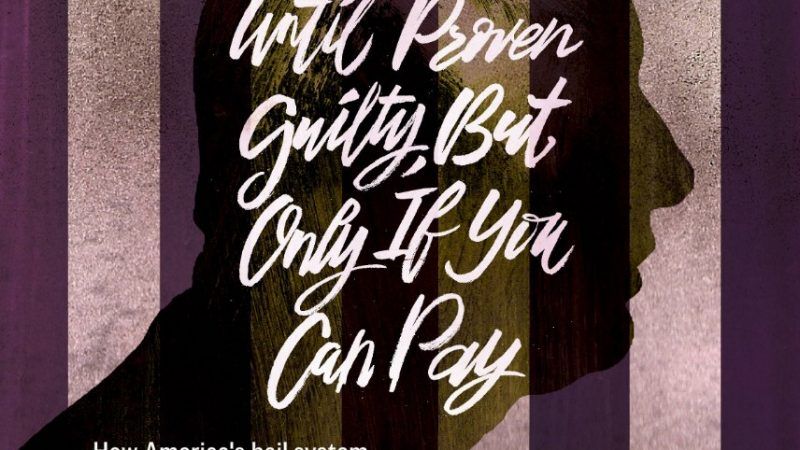Bernie Sanders Introduces Bill to Eliminate Cash Bail
"Our destructive and unjust cash bail process is part of our broken criminal justice system and must be ended."

Between 400,000 and 500,000 people are behind bars but haven't been convicted—they're just awaiting their day in court. Sen. Bernie Sanders (I-Vt.) is unveiling legislation today to help them, by ending the use of money bail on the federal level and nudging the states to do the same.
The No Money Bail Act would prohibit the federal government from using any payment of money as a condition of pretrial release for criminal cases. It would call for grants to develop alternatives to money bail and to improve pretrial practices with the aim of reducing the number of people detained in jail prior to trial. And it would push states to come along with the shift by denying them access to Justice Department grants if they continue using money bail.
Poverty is not a crime and hundreds of thousands of Americans, convicted of nothing, shouldn't be in jail because they can't afford cash bail. Our destructive and unjust cash bail process is part of our broken criminal justice system and must be ended. https://t.co/IETZaldTwS
— Bernie Sanders (@SenSanders) July 25, 2018
A House companion bill was introduced by Rep. Ted Lieu (D-Calif.). He has intrduced similar bills in previous sessions that haven't gone far. This time he argued, in a prepared statement, that the
money bail system is irrational and dangerous. People who are not at high risk but are poor remain incarcerated, while people who may be dangerous are set free if they have the funds. It's maddening to see that those with money can buy their freedom while poor defendants languish behind bars while awaiting trial. I'm grateful Sen. Sanders is introducing a bill that moves to end our justice system's reliance on money bail. I previously introduced legislation in the House that addresses this issue and I look forward to working with Senator Sanders. The money bail system warrants sustained outrage because America should never be a nation where freedom is based on cash on hand.
This legislation is unlikely to get anywhere. Last year Sens. Kamala Harris (D-Calif.) and Rand Paul (R-Ky.) introduced a bill that would create a grant fund to help states research alternatives to money bail. It has been languishing in committee since last July. What Sanders and Lieu are proposing goes further, and it faces a White House and Justice Department that have been largely hostile to criminal justice reforms.
The American Civil Liberties Union immediately declared its support for the legislation. "Cash bail keeps close to half a million people in jail before trial because they can't afford to pay," ACLU Senior Legislative Counsel Kanya Bennett noted in a statement. "It criminalizes poverty, disproportionately impacts people of color, and entrenches thousands of Americans in an unjust and unfair system. The only winners of the cash bail system are bail agents and their insurance backers who profit between one to two billion dollars a year."
New Jersey eliminated most cash bail as part of a suite of criminal justice reforms that were researched before implementation. Initial results are promising, but the state is still collecting data from its first full year of a system focused more on pretrial monitoring and communication with defendants. (Check out Reason's cover story for our August/September issue for a closer look at how it has all worked out for them.) But bail reform doesn't always work out as planned. In Maryland, a requirement that judges should consider money bail as a last resort led to defendants being denied any form of pre-trial release. The result: more people detained in jail. So there may be drawbacks to a top-down push for fast-tracked changes from people who won't have to deal with anything that might backfire.
Sanders' bill gives states three fiscal years to implement new bail systems before cutting off grants, so it's not expecting a miraculous, immediate shift. But there's been a lot of resistance to these reforms: from the bail industry, from judges who face public backlashes if somebody they've allowed out commits crimes, and from jail and prison staff whose jobs are linked to high incarceration rates.


Show Comments (48)